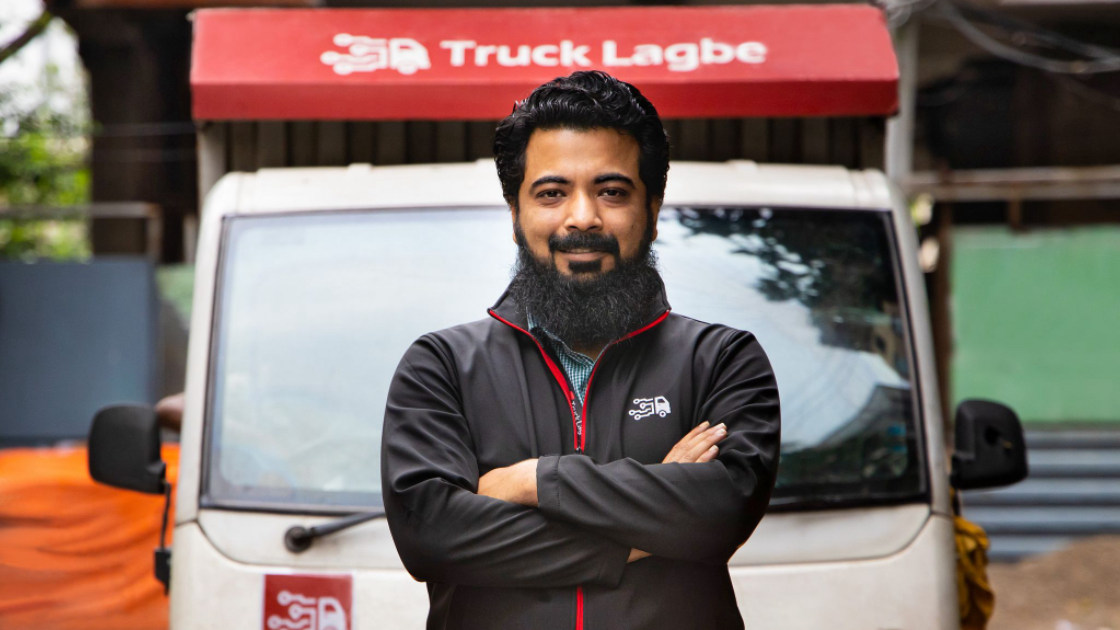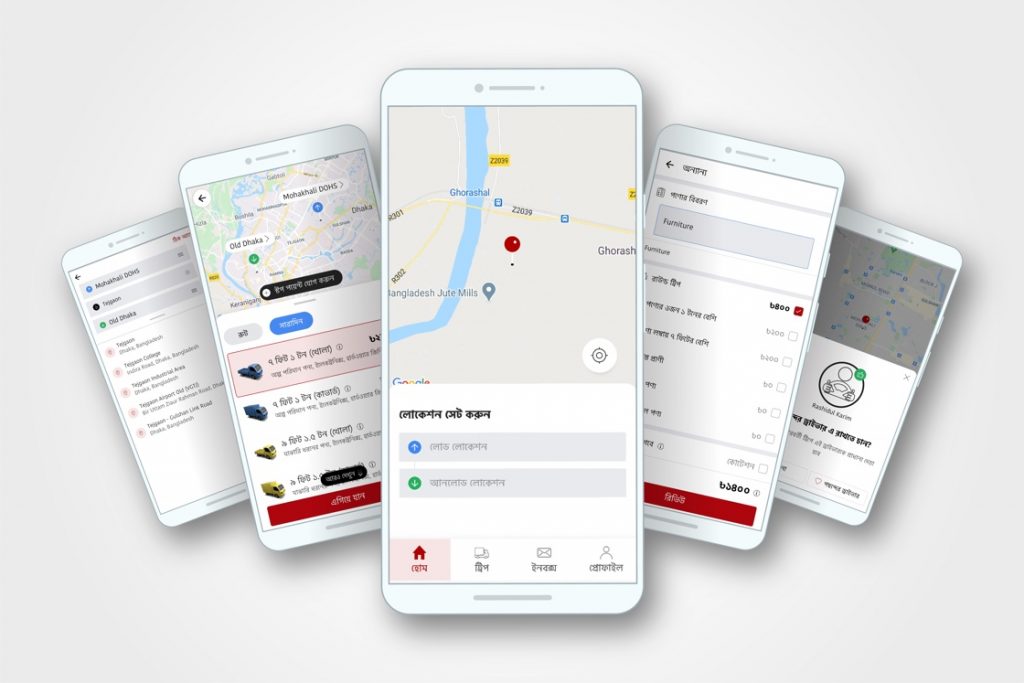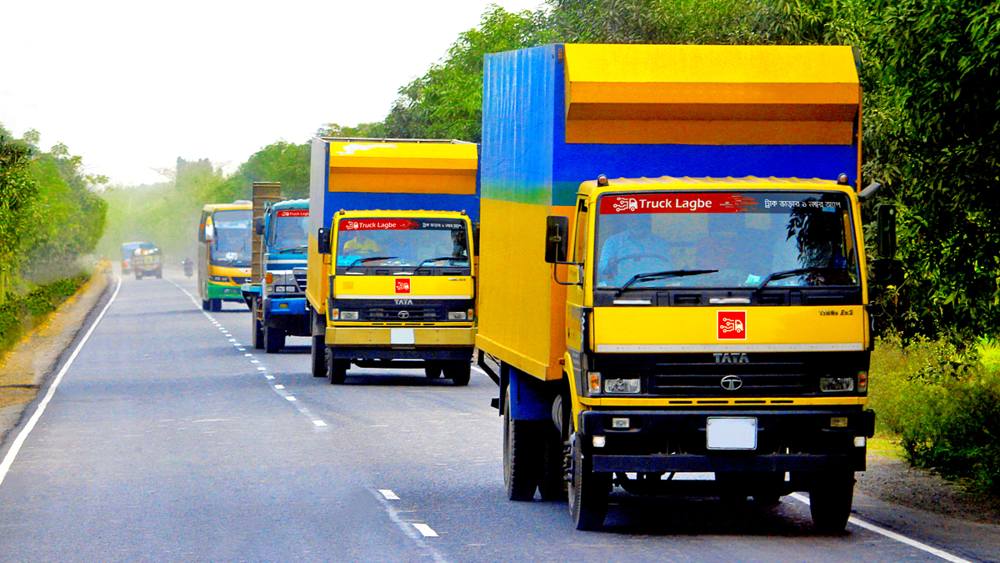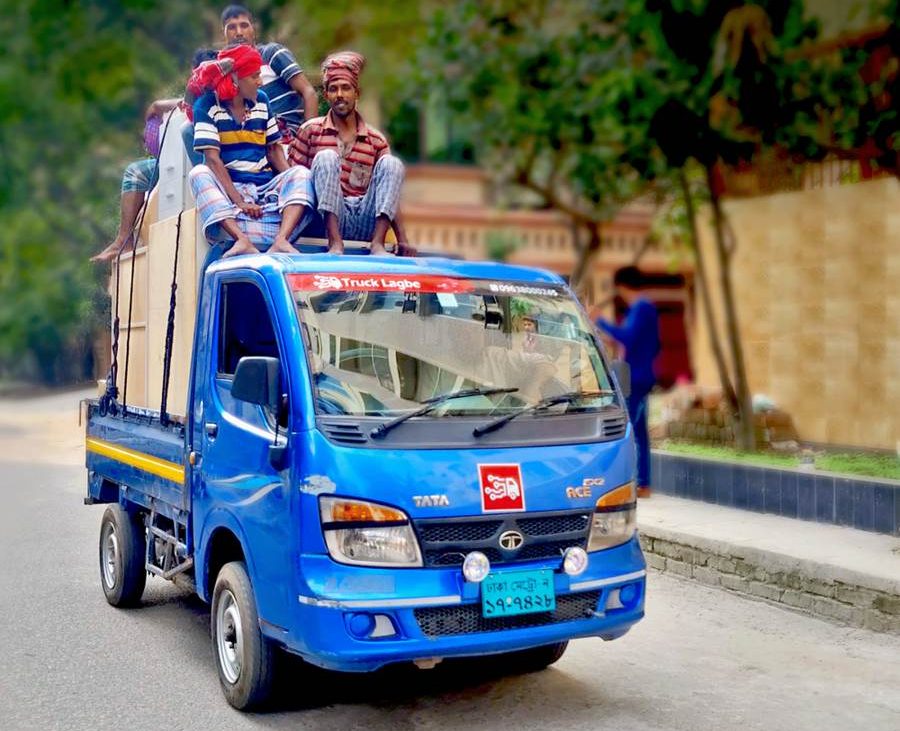
In this excellent conversation with Future Startup, Truck Lagbe co-founder and CEO, Anayet Rashid, shares about the latest developments at the fast-growing digital trucking startup, the impact of the pandemic on the trucking industry, and lessons he has learned in entrepreneurship over the past years.
We cover Truck Lagbe’s growth, evolving product and operation, business model, expansion, strategic ambitions, growth plans, and priorities for 2021 and much more.
Future Startup: Truck Lagbe started as a small operation in 2017. You have evolved significantly over the past few years and we have documented some of it at Future Startup. Where do you stand today?
Anayet Rashid: We have seen an excellent growth of our business. We have expanded our product offerings and services. Launched a new version of the app. Introduced new features and facilities for both our end customers and driver and owner partners.
Our brokerage business has grown pretty big and constitutes the majority of our business. But the majority of our trips come from the marketplace. Hence we have to focus on these two businesses separately.
We launched a new version of our app in November 2020. Improved the truck hiring process making it seamless for SMEs and consumers. It is now more like Uber, with which the users are accustomed. Hiring trucks through the Truck Lagbe app is super fast. For small trucks within Dhaka, you can hire as quickly as 3 seconds. We have added some great features for which we have received excellent feedback. After the launching of the latest version, we have seen consistent growth in the number of repeat users -- 40% of the users use our app repeatedly.
We have worked hard to build a customer-focused product. Thus we tried to understand the needs of our users. We have added simple, but effective features like the option to save an address. Also, people tend to use a general name for a place to make it easier to remember. For example, suppose a truck has to transport goods to a company that is located near Gazipur depot. It will be easier for a driver to understand the location if the customer uses the name Gazipur depot rather than the name of the company the goods have to be transported to. So it would be convenient for the users if they can find a location by its local or common name through our app. We have added these features so that people can navigate easily.
While hiring trucks, if you know a driver whom you trust and are on good terms, you would like to hire him again and again, rather than hiring a new one. We have added a feature for this where one can hire a driver he has worked with before. Despite the fact that people could bypass us and hire the same driver directly, reaching out to the driver to make the truck hiring process more convenient. People can also block drivers.
We have made the app user-friendly. Users can see the profile of the drivers including whether or not the driver has a GPS system. Other features we have added are the option to tell the driver what type of product needs to be transported. For example, if someone is transporting fragile or heavy goods, s/he can mention it beforehand. It makes hiring the right truck easier. Because all trucks can not carry all types of goods. For example, there are two types of 12 feet trucks, one type can carry 1.5 tons and another can carry 3.5 tons. So if a user wants to transport something which weighs more than 1.5 tons, then it should be mentioned beforehand; so that trucks only capable of carrying that much weight can do the bidding.
We have fine-tuned our pricing engine and added fixed pricing. So this is what we have been working on to make our app more user-friendly and the expectation we had has been fulfilled upto a certain point. We have received better reviews after launching the new product.

Future Startup: These are very useful features. Could you give us a brief of your brokerage and marketplace businesses?
Anayet Rashid: Marketplace is where we intervene between the customers and the truck owners to help them to find each other. Here we connect between the customers and the truck drivers through our app. For that, we take a commission.
On the other hand, the brokerage is where we provide customized services for enterprises. Enterprises have needs that are different from individual customers and SMEs. Enterprises can operate with us route-wise or contract-wise through spot pricing or fixed pricing and cash or credit transaction. They need value-added service. From our side, we provide them with a designated key account manager (KAM) who handles their whole operation. Enterprises have monthly billing cycles. We need to make sure the bills are sent to them in time in their own format.
Enterprises reach out to us if they need trucks to transport goods to certain locations and we help them regarding that. In some cases, some enterprises have a fixed price for the trucking service and we have to work with them at that price. Some enterprises want to know the spot price where we decide the price.
While sending goods in different locations it’s convenient if you only need to contact a single point for that and hence enterprises prefer our service. Keeping contact with several truck drivers at the same time is troublesome and hard to keep track.
We piloted our brokerage business before the pandemic and now it is operating in full swing. We are working with a good number of big enterprises at present. Both sides are benefiting from this. They are helping us to improve our product quality and we are making hiring trucks and logistics management more convenient for enterprises.
Future Startup: Could you give us an overview of Truck Lagbe operation today?
Anayet Rashid: We are aspiring to build an ecosystem for trucking where all the services related to trucking will be under one umbrella. For that, we want to bring all the trucks under our system. We want to build an open ecosystem that will be beneficial for all stakeholders related to this sector. We want to help owners, drivers, brokers, and everyone in the trucking industry through our system.
Let me explain why brokers are important in the truck hiring service with a simple example. Suppose there are 100 trucks, among which only 20 trucks are technologically enabled. Brokers help the rest 80% of the truck owners to get trips. We can not overlook the offline segment if we want to bring every truck owner under our system. And if we want to help the industry and the customers, working with everyone is more efficient.
This is the next evolution of Truck Lagbe. We are working on something, which, if works, will reduce 10% of the backhaul of our MTO. We want to create a relay trucking service. For this, we need everybody on this platform to reach our goal.
The changes we have made over the past months are showing visible results. We had the highest number of drivers active on our platform in March and we had the highest number of sales. The number of people and companies using our platform has been growing consistently. It is a good sign that people are getting accustomed to our service.

Future Startup: How big is your marketplace now?
Anayet Rashid: Within Dhaka, we are providing the best truck hiring solution. But our service has become concentrated in some districts. We want to expand our service in all the districts of Bangladesh.
To our assumption, at the current condition of the market, the number of total trips per day is around 2.5 lakhs. I can’t give you any number. I would say it is a huge market and we have a long way to go. Our growth rate is around 30%-35% from quarter to quarter.
Future Startup: How big is your team now? What does the operation look like?
Anayet Rashid: We have around 100 people now. We have people for ports and depots. We have a team in Khulna.
We have started project logistics recently where we transport bulk products like sand, ceramic clay, rocks, etc for different projects. We have a team for that with a very good team leader and brilliant team members. We started with Khulna. Through these, we can be involved in large-scale projects such as bridge and power plant construction. The advantage of doing these large-scale projects is that you can claim names for them. It makes you feel better. We are working on finding ways to digitize project logistics and after working on several projects, we will implement digitization to benefit both the project owner and the supplier.
Moreover, we have added several trucking services and products in the owner app and tweaked the app a little bit. One of the products we have added is GPS tracking. We got our GPS tracking license last year. Now we are capable of providing GPS tracking as a service. We have launched the initial version of GPS tracking and within two months hopefully, we will launch the full-fledged version with features necessary for the trucking industry.
Setting a GPS tracking device can benefit you in various ways. The GPS tracking service providers in Bangladesh buy off-the-shelf modules from abroad, add a new scheme and sell those as products. They do not design their products for a special segment of customers. Those telemetric devices have common features and many of them are not useful for truck owners. We are designing our GPS tracking devices specifically for truck owners and those who operate fleets.
We have a very good design team. They designed the product keeping the perspective of the truck owners in mind. So this is going to be absolutely different from other GPS tracking devices and more friendly for a truck owner. Through our device, the truck owners will be able to save money and earn more. We believe it will be really handy for truck and fleet owners.
Future Startup: Will you be able to use the GPS tracking device for other purposes?
Anayet Rashid: Of course. It will help the truck hirer to keep track of the truck. We can use the location data for pattern recognition. We will also try to match up the GPS tracking service with our pricing engine. For us, it is an ancillary sale that can benefit all of our stakeholders.
Our next plan is to sell tires. In Bangladesh, counterfeit engine oils are sold more than genuine ones. Because it is hard to find genuine products. The same goes for tires. There is an entire industry for tire rebonding where used tires are resold after being refurbished. As a result, it is hard for truck owners to find genuine tires for their trucks. We want to bring in the companies who manufacture tires and help them to sell their tires through our platform.
We are going to launch a life insurance policy for truck drivers collaborating with Guardian Life Insurance. It will be a one time payment insurance for a year and the drivers will get a good return.
We have ambitious plans for the whole trucking ecosystem.
Future Startup: Do you have any plans to bring the petrol pumps and garages under your system?
Anayet Rashid: Our main goal is to bring all the services related to trucking under one umbrella. There are opportunities for SaaS as well. We always make plans keeping all the stakeholders in mind.
Future Startup: Have you started working on things like repairing shops, etc?
Anayet Rashid: Repairing shops operate in a different way and they are different from our business. The idea itself can be a startup. We want to connect the repairing shops through our platform though.
Future Startup: That’s what I wanted to mean. Do you have any plan such as listing certain repair shops or petrol pumps, where the truck drivers working with you will go for services?
Anayet Rashid: We have some plans. But we do not want to focus on multiple things at once. We want to take one step at a time. We have seen that every truck owner usually goes to a particular garage for servicing their trucks. So they already have people they know and want to work with. Since servicing is quite a personal matter and trust is involved, people usually go to people they already know from before.
There are some problems where drivers need to service trucks in the middle of the road. Maybe we can provide a solution for that.
Future Startup: Any update on your latest round of investment?
Anayet Rashid: Investment takes some time and right now we do not want to share anything until it’s confirmed.
Future Startup: How is Truck Lagbe doing right now overall?
Anayet Rashid: We have streamlined and automated our entire collection process. It was brilliantly fine-tuned by one of our ex-colleagues and we got a brilliant result after launching our product. We initially thought that our user base would not adopt digital payment. However, we have been proven wrong. After launching it took only a month for all the truck owners who work with us to adapt to this new automated system. It was beyond our expectations.
Pandemic has been a good thing for us. The event pushed us to pay greater attention to our business. We have worked to improve our business. We now have a strong business and are growing.
Future Startup: How does your commission system work?
Anayet Rashid: For the marketplace, we charge a 5% commission and for brokerage, it varies depending on the customer. For our ancillary products, we are going for a commission-based model where sellers pay us a commission. We are building this business. We have introduced our GPS tracking product for now and we are getting an excellent response from truck owners so far. As I mentioned earlier, we will also sell tyres, oils, and other trucking-related products through our platform. Since we have truck owners and drivers on our platform, this could be a useful service for them.
One of the exciting things we are working on right now is a product specifically for the enterprise's clients and we will soon launch the Beta version.
Future Startup: There are a couple of other players doing trucking. How do you see the competition landscape in the market?
Anayet Rashid: I admire competitors. Our competitors always keep us on the run and push us to do better. All of the startups in the trucking industry are working to digitize this industry and increase its efficiency. This is a difficult industry and more players are not necessarily bad. Only one teacher can not educate a whole village. But it is possible for several teachers to educate the whole village, though there will be some competition between them.
The more players in the trucking industry will join, the more funding will come to this industry and the more this industry will grow. Everybody in this industry is either trying to innovate or specialize in an area or bring diversification. As a result, not only the competitors of this industry are being benefited, but also the truck owners and drivers are also being facilitated. It’s a good sign.

Future Startup: What are the major challenges for Truck Lagbe now?
Anayet Rashid: One major challenge, for now, is to help large truck owners and drivers adopt the technology. We have overcome the resistance we faced for small trucks. We are now focusing on large trucks. It is crucial for them to become automated. Second, our service has become concentrated in a few cities. Although we get trips from all major cities, to make the platform efficient we need to introduce more routes, more drop points, and more drivers and consumers.
There are industry-wide challenges. A huge shortage of truck drivers in the market. Truck driving is not easy. Drivers need to be better skilled. A separate license requirement makes the situation even more complicated. Getting a license for truck driving is hard in Bangladesh. I think the criteria should be a bit more flexible so that more people can get the license. People who take on truck driving do so because they don’t have many other options. This is not an easy job. You will literally have to spend your life on the road, deal with a lot of different people, and unpleasant experiences. The earning is not huge either. You get a couple of thousand taka as a fixed salary and the rest depends on the commission — if you get a trip, you get a commission. So it is not useful to make it hard for people to get a driving license. Well, one must have to know about truck driving and have relevant experience. But these requirements also need to be sensible. Otherwise, the scarcity of truck drivers will remain. At the same time, people need to change their negative views about drivers. Currently, the social status of drivers is not positive. As a result, people don’t feel encouraged to come to this profession. This perception needs to change. One of our goals at Truck Lagbe is to improve the perception of drivers.
We need to work more on the technological aspect as well. We have built a quite robust technology platform. But we want to further build the platform and improve technology adoption of both our driver-partners as well as our business customers.
Furthermore, we are partnering with financial institutions to finance trips. For this, we are collaborating with City Bank and IPDC and they do supply chain financing for the trips. We want to grow this model and give its access to all the enterprises, SMEs, and other sectors to make the trip financing process easier.
Future Startup: What are your priorities for 2021?
Anayet Rashid: Geographic expansion is a priority for us now. We already have an office in Chittagong. We are going to open our branches in Gazipur and Khulna. We are planning to open branches in several other major districts. We have built an excellent operation in Dhaka. But trucking is not Dhaka alone. It happens across the country. With the geographic expansion, we will be able to work with a greater number of drivers and owners, serve more customers and better serve our existing customers. The expansion will also allow us to work directly with local drivers and truck owners and provide them with hands-on training. Local presence can also be used for various other purposes such as dropping off shipments, etc.
The second priority is to bring and grow the ancillary sales business such as tires and other relevant products and services, etc under our platform within this year.
Then there are regular business goals in terms of the number of customers we want to serve and regular business expansion goals.
